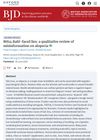 115 citations,
June 2004 in “Pediatrics”
115 citations,
June 2004 in “Pediatrics” Children, especially teenagers, can get severe SARS-CoV infection with symptoms similar to adults, but they typically recover well with supportive care.
 30 citations,
June 2019 in “Frontiers in Endocrinology”
30 citations,
June 2019 in “Frontiers in Endocrinology” The document concludes that managing non-classical congenital adrenal hyperplasia in females requires personalized treatment, genetic counseling, and a team of specialists.
 30 citations,
May 2004 in “Journal der Deutschen Dermatologischen Gesellschaft”
30 citations,
May 2004 in “Journal der Deutschen Dermatologischen Gesellschaft” The document concludes that early diagnosis and treatment are crucial for children with hair loss to prevent permanent damage, although not all conditions can be effectively treated.
 25 citations,
July 2021 in “Journal of Medical Virology”
25 citations,
July 2021 in “Journal of Medical Virology” COVID-19 can cause various skin issues, including rashes and hair loss, which usually heal on their own and don't always indicate severe illness.
 17 citations,
December 2001 in “Dermatologic therapy”
17 citations,
December 2001 in “Dermatologic therapy” Different treatments for alopecia areata have unpredictable results and varying success rates.
 12 citations,
March 2015 in “Pediatric Dermatology”
12 citations,
March 2015 in “Pediatric Dermatology” Early diagnosis and treatment of PCOS in young people is important to prevent long-term health problems.
 9 citations,
August 2018 in “JAAD Case Reports”
9 citations,
August 2018 in “JAAD Case Reports” Tofacitinib can temporarily improve hair growth in alopecia universalis, but its effectiveness may decrease over time.
 6 citations,
June 2000 in “Psychiatric Services”
6 citations,
June 2000 in “Psychiatric Services” Maintaining sexual health after menopause is possible with patient approaches, hormone supplements, and therapy, despite needing more research.
 20 citations,
February 2022 in “British Journal of Dermatology”
20 citations,
February 2022 in “British Journal of Dermatology” People with alopecia areata have a higher risk of depression and anxiety, and often face unemployment and work absences.
 19 citations,
January 2015 in “Journal of Clinical and Diagnostic Research”
19 citations,
January 2015 in “Journal of Clinical and Diagnostic Research” The main causes of diffuse hair loss in women are telogen effluvium and androgenetic alopecia, often related to stress and iron deficiency.
7 citations,
March 2022 in “Journal of the American Academy of Dermatology” Stress can trigger or worsen alopecia areata.
5 citations,
January 2015 in “Saudi journal for health sciences” Alopecia areata in Taif is common, mainly immune-related, and best treated with topical corticosteroids and vitamins.
 4 citations,
November 2022 in “Frontiers in Medicine”
4 citations,
November 2022 in “Frontiers in Medicine” People with alopecia areata are more likely to have anxiety and depression and a lower quality of life.
3 citations,
October 2023 in “Cosmetics” Healthy lifestyle changes can significantly improve skin health as you age.
 January 2024 in “JEADV clinical practice”
January 2024 in “JEADV clinical practice” Gender-affirming dermatology treatments generally improve mental well-being for transgender individuals, but more research is needed.
 December 2023 in “Journal of family medicine and primary care”
December 2023 in “Journal of family medicine and primary care” Many people in Saudi Arabia experienced hair loss after COVID-19, especially women, those treated with antivirals, and those with a history of hair shedding.
15 citations,
July 2021 in “JAMA Dermatology” Androgenetic alopecia negatively affects quality of life and self-esteem, especially in women, but not depression.
11 citations,
January 2018 in “International Journal of Trichology” The true incidence of post-Finasteride syndrome is unclear, and more research is needed.
3 citations,
August 2022 in “International Journal of Molecular Sciences” COVID-19 can cause hair loss, and treatments like PRP and stem cells might help.
 2 citations,
July 2023 in “Life”
2 citations,
July 2023 in “Life” COVID-19 can cause temporary hair loss, which is commonly reversible with treatment.
 July 2023 in “Journal of Cosmetic Dermatology”
July 2023 in “Journal of Cosmetic Dermatology” Practitioners treating hair loss need better education and resources to overcome challenges like commercial bias and ethical dilemmas.
November 2021 in “Evidencia” Young patients using finasteride may have higher risks of anxiety, depression, and suicidal thoughts.
November 2020 in “International Journal of Research in Dermatology” Dermatologists prefer minoxidil for mild female hair loss and a combination of PRP and minoxidil for severe cases, with a need for universal treatment guidelines.
 June 2024 in “British Journal of Dermatology”
June 2024 in “British Journal of Dermatology” Misinformation about alopecia is common online and can harm patient choices.
 1 citations,
August 2023 in “Journal of the American Academy of Dermatology”
1 citations,
August 2023 in “Journal of the American Academy of Dermatology” The guide helps dermatologists diagnose and treat different types of hair loss.
119 citations,
February 2009 in “Neuroscience & Biobehavioral Reviews” Trichotillomania involves hair pulling and can be treated with therapy and medication.
83 citations,
August 2018 in “BJOG” Uterine transplants for transgender women are feasible but need more research.
 12 citations,
December 2020 in “Journal of The American Academy of Dermatology”
12 citations,
December 2020 in “Journal of The American Academy of Dermatology” The COVID-19 pandemic increased symptoms in people with skin picking and hair pulling disorders.
 July 2024 in “Medical Science Monitor”
July 2024 in “Medical Science Monitor” Women with type D personality and PCOS experience more stress and use less effective coping strategies.
 May 2024 in “Indian Journal of Dermatology”
May 2024 in “Indian Journal of Dermatology” Androgenetic alopecia in men is genetic and linked to health issues like obesity and heart disease, with treatments including minoxidil, finasteride, and hair transplants.




















